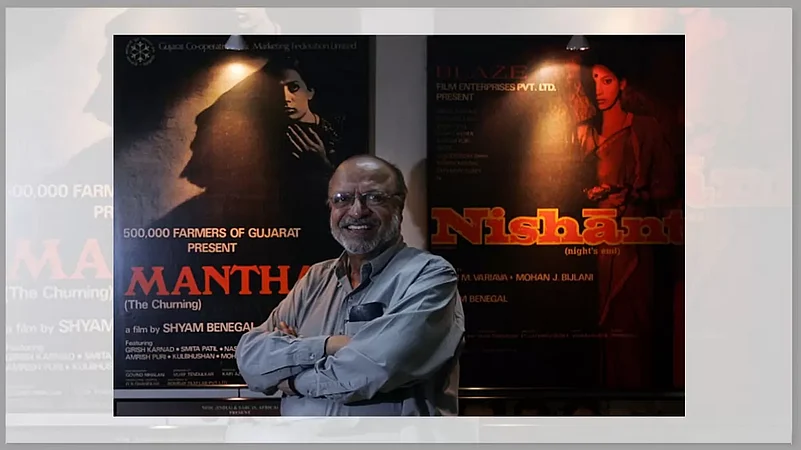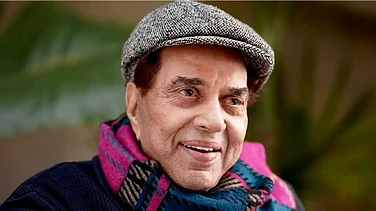Well-known filmmaker and Dadasaheb Phalke award-winner Shyam Benegal’s biographical movie on Bangladesh’s first President Sheikh Mujibur Rahman, Mujib – The Making of a Nation, has recently been released in Bangladesh and India. It’s a collaborative project between the Indian and Bangladesh governments. Arvind Das spoke to him about this film, edited excerpts:
Arvind Das: Earlier, you have directed ‘The Making of the Mahatma’ (1996) and ‘Netaji Subhash Chandra Bose: The Forgotten Hero’ (2005). How difficult was it to direct a biopic on the father of Bangladesh?
Shyam Benegal: Oh, in fact, it was easier. Mujib’s daughter, Sheikh Hasina, is the present Prime Minister of Bangladesh. So, I met her and listened to her stories about her family, particularly about her father, mother and brothers, who were all assassinated. It’s about them, so you get to know both about their political persona, as well as about their domestic persona. We get to know them as relations, which outsiders are not likely to know.
AD: It’s a collaborative project of two governments, India and Bangladesh. Any kind of pressure you faced or dictate you received from the governments in power while making this movie?
SB: None, none at all. Matter of fact, I was told you make the film the way you perceive. The way you think, the way you believe. You should make the way a character should develop. And there were enough materials available. Mujib had kept diary notes when he was frequently in jail and incarceration. He had a kind of literary flair like Nehru had. Nehru wrote three books in jail.
AD: Renowned Malayalam film director Adoor Gopalkrishnan once said to me in an interview that he couldn’t direct a Hindi film because he didn’t understand the language enough and won’t be able to direct actors. You have always made your movies in Hindi/Hindustani. This movie was originally made in Bangla; did you face difficulty in directing actors?
SB: No, different people think differently. Their perceptions are also different. Adoor is the way he feels. For me, I never had a problem like that. I don’t know Bengali, but I had very good language advisors. Like most Indian languages, Bengali also has local idioms. For instance, if you are a Bengali from West Bengal, the idioms are not necessarily the same idioms of Bangladesh. You find that with Hindi, too. There is an idiom: language changes according to the way you drink water. Say, for instance, Dakkani. People living in Hyderabad speak Dakkani. They always say, ‘Hussain sagar ka pani peeta hai’. Dakkani of Hyderabad is different from Mysore.
AD: Although this movie is about the times and struggle of Mujibur Rahman and the coming of a Nation, it has very lilting music and songs. It reminded me of your musical films like Sardari Begum (1996) and Zubeida (2001). Please tell us about the songs in the movie.
SB: There are three songs in the film. One is the opening sequence. It's a rural Bhatiyali song (Abujh Majhi) about the wonderful landscape of Bengal, the richness of Bengal and so on. The second one is a wedding song (Ki Ki Jinish Enecho Dulal). And the third one is a Marsiya – when somebody of eminence dies, you have a mourning chant, a poetic form. It’s about Mujib himself. The words are - where you have gone?
AD: About the marriage song, Ki Ki Jinish Enecho Dulal has different words in Bangla and Hindi. In the Bangla version, there is a reference to Sita’s Sinoor (Vermillion). It's also about our syncretic culture.
SB: This is the song sung for the bride-to-be. The man is going to marry her. He brings sindoor to apply on her maang and that sort of thing. It’s also a traditional song sung just before the nuptials. We changed it in the Hindi version but in Bengali, it’s the same. Again, this is part of the tradition.
AD: How has the film been received/appreciated in Bangladesh?
SB: It’s doing extremely well and still going strong. It opened in 170 cinemas all across Bangladesh. They don’t have many cinemas, so they are using school halls. …they are adding cinemas. The picture has become a run-away hit.
AD: While watching the movie, I felt that there was no contradiction or conflict in his character. He came across a loving family man…
SB: Like a large number of very famous politicians, his domestic life was not an unhappy one. If you look at other people, for instance, Nehru. Of course, he lost his wife very early. And he didn’t know her too well because he was in jail most of the time. Even Gandhi is accused of having neglected his family. His eldest son, in fact, said that to his face. These are things that happen to people who are not only imminent but driven by a certain kind of idealism, like Nehru and Gandhi and so on. Mujib was the same. But strangely enough, his rapport with his own family was not so alienated. He was very close to his wife and had a happy domestic life. Although, he was put in Jail umpteen times, much like Gandhi and Nehru.
AD: In the movie, I didn’t find any criticism of the politician, Mujib. He became president and took all the powers in his hand before he was assassinated. Can you elaborate on this?
SB: There is a kind of tragic flaw in all heroes. Shakespeare's plays have that. So, you have tragic flaws even in Mujib. When you get power, it has a way of alienating you from your people. What happens is, when there is a threat to your life, you create differences around you, which means, in some way, your ability to perceive what people are thinking about you. You will not hear it at all because you have been insulated from all of that. Also, people around you are not likely to say anything that may upset or make you angry. This happens to all of us. This is not something unusual.
AD: Last question, you are 88 years old; what is next? Which project are you currently working on?
SB: I am not immediately planning to do anything, but I do have a couple of projects in mind.






















